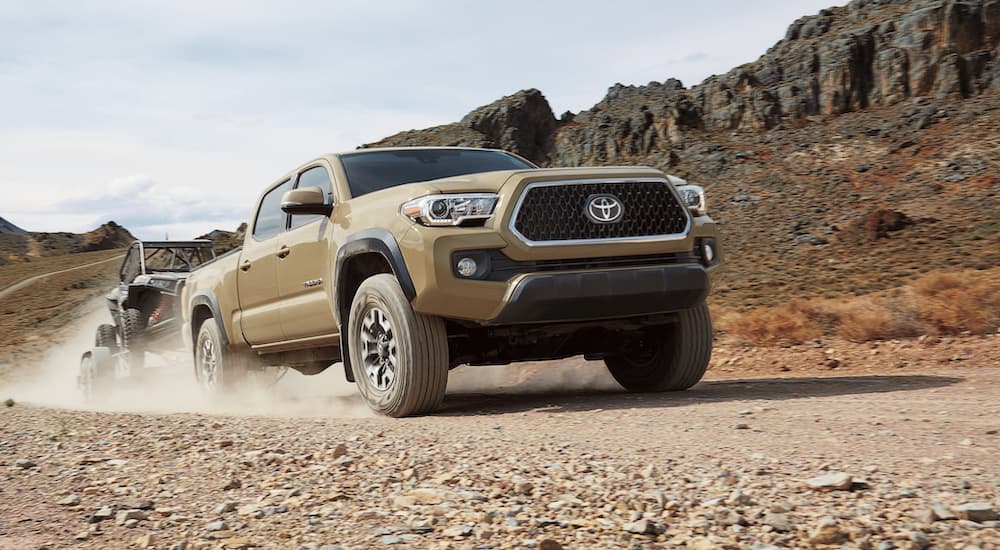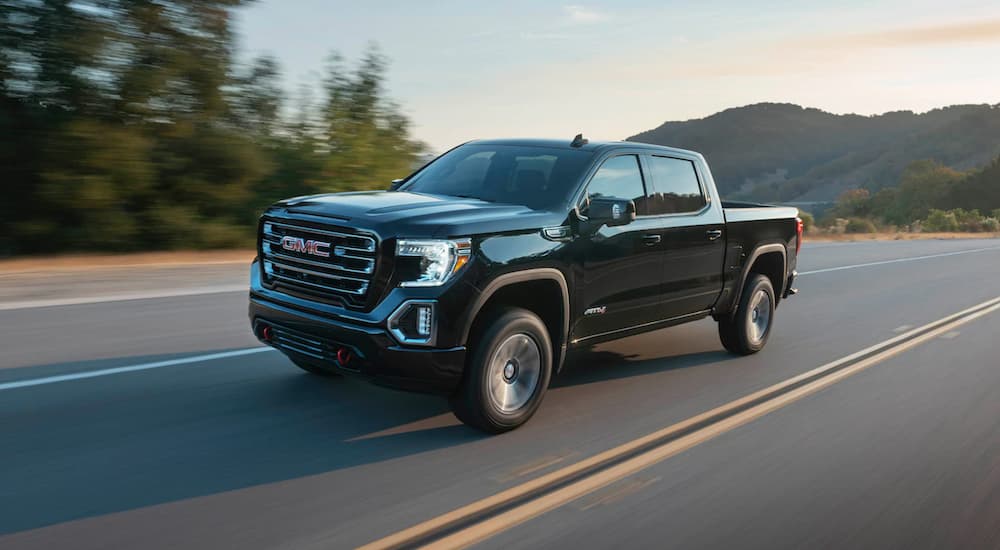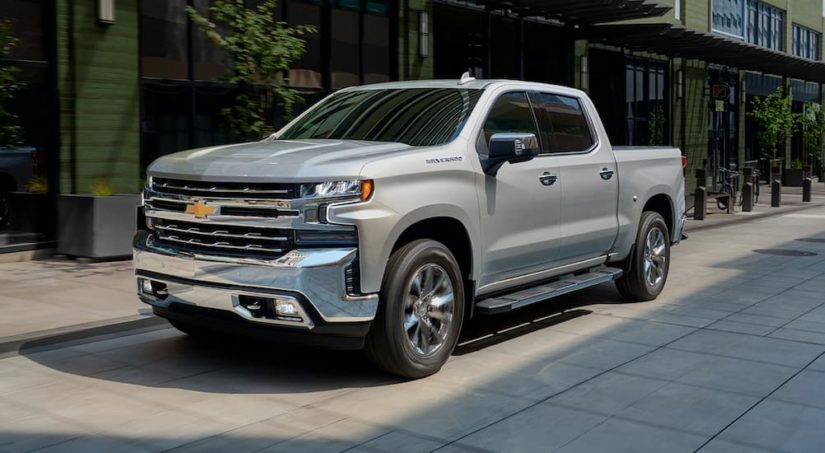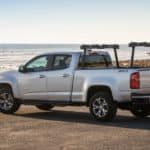When you’re browsing through pickups at a used truck dealer, there are plenty of factors to consider. Different models have different towing and hauling capacities and safety features, not to mention more specific functions like off-road capability. But one thing that every used vehicle buyer should keep in mind is mileage. The more miles a truck has on it, the more wear and tear you can expect.
However, mileage is more complicated than you might think. High mileage doesn’t necessarily equal a bad truck, just like low mileage doesn’t guarantee a good one. While some basic milestones, like 100k, are ingrained in the minds of sellers and buyers alike, it’s important to keep in mind that the importance of mileage can vary greatly from vehicle to vehicle. On top of that, trucks tend to be built to withstand more use than cars, so you don’t want to go shopping for a pickup with a mindset that applies to sedans. Let’s take a look at when mileage matters on a used truck and when it doesn’t.
Automakers You Can Trust
If you’re going to buy a truck with a lot of miles on it, you want to make sure you’re sticking to reliable models from automakers you can trust. Models that have a long history are more predictable than those that have hit the scene recently since they have a proven record. You can only expect so many real-world miles to be built up on a model that has only been in production for a year or two.
The Chevy Silverado, along with its GMC sibling the Sierra, is one example of a truck that’s been around the block and proven that it’s built to last. Keep up with regular maintenance, and these trucks can easily stay in good working order for upwards of 100,000 miles. Looking at one extreme example, Missouri native Brook Smith used a 2007 Chevy Silverado to tow RVs across the country for years, to the point where, as of 2020, his truck had over a million miles on the odometer. Even all those years and miles of heavy towing later, the Chevy was still running just fine on the factory powertrain, without much major service either.
Toyota has long had a reputation for reliability. The Tacoma and Tundra have both been known to rack up plenty of miles without breaking down. Honda has long been known for making long-lasting vehicles, too, though the Ridgeline, with its unibody construction and unimpressive towing capacity, certainly isn’t every pickup driver’s cup of tea.

Model Year
What matters more: a vehicle’s mileage or its age? This is a tricky question to answer with a blanket statement since there will always be exceptions. However, many experts agree that a newer vehicle with more miles is a better bet than an older one with fewer miles.
For one thing, newer trucks come with advantages like more safety features and better fuel economy. And even if a truck isn’t being driven often, its parts are still aging and becoming more likely to cause problems. Apart from overall age, you should also look at the specific model year on the vehicle you’re considering and see if it’s had an unusually high number of recalls, which can be a red flag regardless of the number of miles it has on it.
Vehicle History
Some models are better than others, but even the toughest truck can be ruined by owner neglect. Most dealerships will let you look at the history of their used vehicles, usually through a report from a company like CARFAX. If a truck has a high reading on the odometer, you’ll want to be extra sure that it’s been well taken care of. Its history should show that it’s been brought in for regular maintenance and that it hasn’t been in a significant accident.
Can You Afford Repairs?
If you’re working with a tight budget, then choosing a truck with more miles on it may seem like a good way to save some money. But remember that high-mileage vehicles may need more repairs down the line. If you know your way around an engine yourself, then this might not be a big concern. Otherwise, you can end up spending more in the long run by trying to save money upfront. If you do end up buying a high-mileage truck, it’s a good idea to set some money aside so that you have an emergency fund for any repairs or part replacements that might be necessary.
Short Commute vs Long Haul
How you’re going to be using your truck also matters. If you know that you’re not going to be driving too far from home, then you don’t have to worry as much about mileage. You won’t be putting too many more miles on the truck, and you won’t be too far away from your local mechanic should you run into any trouble. However, if you know you’re going to be taking your pickup on long hauls or road trips, you should think twice before settling for a high-mileage truck. This is especially true if you plan on driving on rural roads where service is hard to come by or off-road trails where a breakdown can be truly dangerous.

Working Hard or Hardly Working?
Some truck owners just want to be able to hit up a tailgate party or tow a small boat down to the lake on weekends, and not all professions that require a pickup involve particularly heavy loads. When deciding on a model, take a look at the truck’s towing and hauling capacities. If you aren’t coming close to their maximum weights, you can take a more relaxed attitude when considering the mileage. On the other hand, if you’re going to be using your truck for big jobs that will put a lot of stress on it, consider sticking to models that haven’t been used as much.
How’s the Weather?
If you live in a dry, desert climate like the American Southwest, then you will have to deal with side effects from heat, dirt/sand buildup, and the like. However, if you deal with lots of rain and snow each year, you want to make sure that your truck can stand up to the elements. So the more you’re going to be driving in harsh weather conditions, the more you should think twice before settling for a truck that has seen some extra wear and tear.
High Mileage Doesn’t Mean You Have to Steer Clear
Mileage doesn’t exist in a vacuum. When buying a used truck, you need to keep a lot of factors in mind, including make, model, age, and history. Keeping track of all of this can feel overwhelming, especially to younger drivers, but there’s no need to panic. It can be helpful to write down your priorities as a driver before you start the buying process so that you can refer back to your needs and wants without having to keep everything straight in your head.
Beyond that, where you’re shopping also matters. If you’re buying directly from a truck’s owner, it can be difficult to verify important information, and you might get stuck with a lemon. At a dealership, you can rest assured that used vehicles have been inspected by experts, and it will be easy for you to get access to the vehicle’s history report. Once you can trust that the information you’re getting about a model is legit, you can figure out whether or not the number on the odometer is a dealbreaker.



